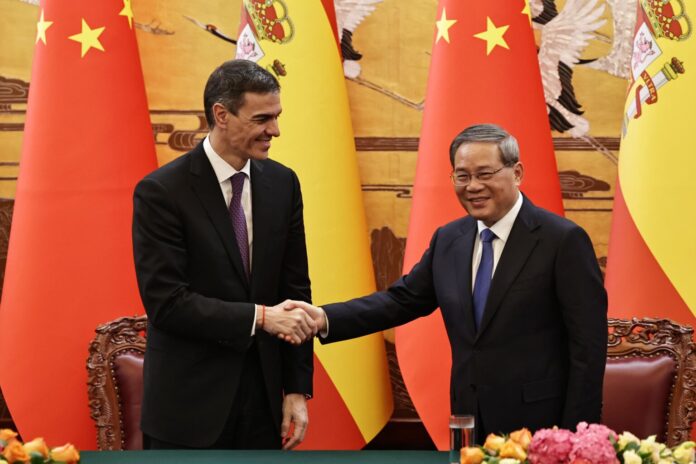EU sees away from West after Trump customs reshaped global trade

After US President Donald Trump imposed duties on imports from Europe and threatened with even higher customs rates, Brussels hurried to adapt his way of trading. The EU is now in an urgent search for new markets and allies that still believe in fair trade and clear rules.
Trump’s re -election in November had already encouraged the bloc to start strengthening trade relations, but events in recent weeks have forced the EU and its member states to make even greater commitments.
The EU’s schedule has been crowded with commercial meetings since January. The block has agreed to strengthen trade ties with Mexico a few days before Trump made a solemn statement as a new president, and on the day of his inauguration he reopened trade negotiations with Malaysia. Then, in February and March, EU top officials met with leaders of India and South Africa to discuss topics including trade, and at the same time actively build closer links with Canada.
In the current April, EU talks with the United Arab Emirates began. « In this unstable world, more valuable than ever are partnerships with confident allies that clearly define the rules of mutual profit, » an EU spokesman said.
This opinion has spread more across the continent since Trump announced the customs rates imported from the EU this month. Initially announced the 20 % customs customs import from the block and then suspended it to 90 days. However, most of the EU imports are still customs 10 %.
Spanish Economy Minister Carlos Querpo at a latest ministerial meeting in Luxembourg has proposed the Customs War with the United States to serve as an impetus for the EU to distinguish trade relations and other partners.
Czech Prime Minister Petr Fiala also stressed the need to find alternative markets. Announced a quick free trade agreement with Mercura (the trade bloc of South American countries covers Brazil, Bolivia, Argentina, Paraguay and Uruguay) or assembling agreements with India or Southeast Asia countries.
« We want the EU to demolish walls where others are building, » Swedish Trade Minister Benjamin Dusa told the TT news agency back in March.
Will the EU come together with China?
Spanish Prime Minister Pedro Sanchez also sees opportunities, especially in Asia. He pledged to « strengthen and balance economic and trade relations » between China and Spain during a visit to the country on April 11. He claimed that he had always made it clear that Spain wanted to « continue to develop them based on balance and reciprocity ».
« We want to contribute to a positive relationship between the United States and the EU, but we need strong relations between China and the EU and between China and Spain, » he added, saying trade rebalance is needed.
The EU in 2024 had a trade deficit of 304.5 billion euros with China.
Chinese President Si Jinping said during that visit that « there are no winners in any trade war and opposition to the world only leads to self -insulation. »
In Brussels, EU sources told the Italian agency Ansa that there was a slight change in Beijing’s stance. Channels are being opened to improve trade relations with the Asian power, and a high -level summit between the EU and China has been announced in July.
However, unequal conditions for competition between companies in both blocks and the ability Chinese products flood the European market despite new obstacles to entry into the US market are leading Brussels to suspect that Beijing could become a compassionate partner in the near future.
EU countries are considering increased trade with India
Belgium also finds opportunities in the current trade climate. Just like the European Commission and several other member states, Belgium considers India an attractive partner. In early March, Princess Astrid of Belgium led a major trade delegation in Delhi and Mumbai. The pharmaceutical industry, defense, diamonds, logistics, aviation and environmental energy were high on the agenda.
« This seems like the perfect moment Europe to decisively conclude free trade agreements with new partners around the world, relying on us more than ever, » Belgian Prime Minister Bart de Wever said when customs were originally released.
The same month, the president of Singapore paid a state visit to Belgium, as another indication of the wider Belgian strategy for deepening ties with Asia.
The future German Chancellor Friedrich Merz is in the same thought. « Global balance is changing and we Europeans need (new trading partners) very quickly, » he said in the current month.
A deal with South America is in sight
The EU has hope that ratification of the trade agreement with South American countries will progress rapidly and that the process can be completed this year. The agreement was reached last December, but in order to be approved, it must receive support from the European Parliament and at least 15 of the 27 EU member states, which is a minimum of 65 % of the population.
It is uncertain whether this will really happen. The deal has received sharp criticism from eco -activists over concerns that it will undermine environmental protection and strengthen the destruction of forests. Farmers also protested against the deal, saying it could put them in a disadvantage, given that products in Mercur countries are subject to less stringent regulations, so they can be produced cheaper.
Several EU countries have expressed dissatisfaction with the agreement, including France, Poland and Austria, but the urgent need for new trading partners could soften their stance and facilitate the ratification of the pact.
Brussels is « in dialogue » with the most affordable countries. The European Commission aims to complete the legal review of the text before the end of next summer. This will enable ratification and force EU countries and the European Parliament, where there are significant opponents, to vote.
Smaller European countries want more free trade
In some smaller European countries there is concern about the possible influence of customs on the economies of major European countries, such as Germany, which they rely on in their trade relations.
Slovenia, as a small and export -oriented economy, has traditionally been mostly tied to European markets, and the United States is even 12 in a row, the most important Slovenian trading partner. Therefore, Slovenian companies are looking for business opportunities in third markets, especially in the Middle East and Asia. According to the Slovenian Statistical Office, in 2024 the value of Slovenian exports in countries outside the EU rose 25 percent annually, while the value of imports from these countries rose 47 percent.
Zdenko Lucic, Secretary of State at the Croatian Foreign Ministry, said the United States accounts for about two percent in Croatia’s commodity exchange. « We have also faced bigger crises, such as Kovid-19 and the war in Ukraine, and our economy has stabilized relatively quickly. »
In Bulgaria, the United States accounts for a relatively small but stable share of foreign trade, approximately 2.5 percent of exports and 1.2 percent of imports, according to the Ministry of Economy and Industry.
The Government of Macedonia thinks this is the moment when the country could improve ties with the United States. Customs introduced for Macedonia should not panic and should not be interpreted negatively-Finance Minister Gordana Dimitrievska-Kochoska told MIA news agency.
– We may use this as a chance for the Macedonian economy, because the Government has established good communication with Washington, which is very important. Although our trade with the United States is currently lower than one percent, this can still be considered an advantage in the coming period-said Dimitrijeska-Kochoska.
Bosnia and Herzegovina has a similar view. It relies heavily on the EU for trade, with over 70 % of exports and 66 % of imports tied to the EU. Although the United States is a smaller trading partner, especially for the export of defense goods, the new US customs duties harmed the country’s defense sector, encouraging it to consider abolishing its own customs duties to facilitate trade and eventually conclude a free trade agreement.
In the case of Ireland, however, customs could have a significant negative impact. In 2024, the country exported goods worth 72 billion euros in the United States. Much of this was pharmaceutical products. The pharmaceutical industry has been released from customs so far, but Trump signals that he intends to change this.







